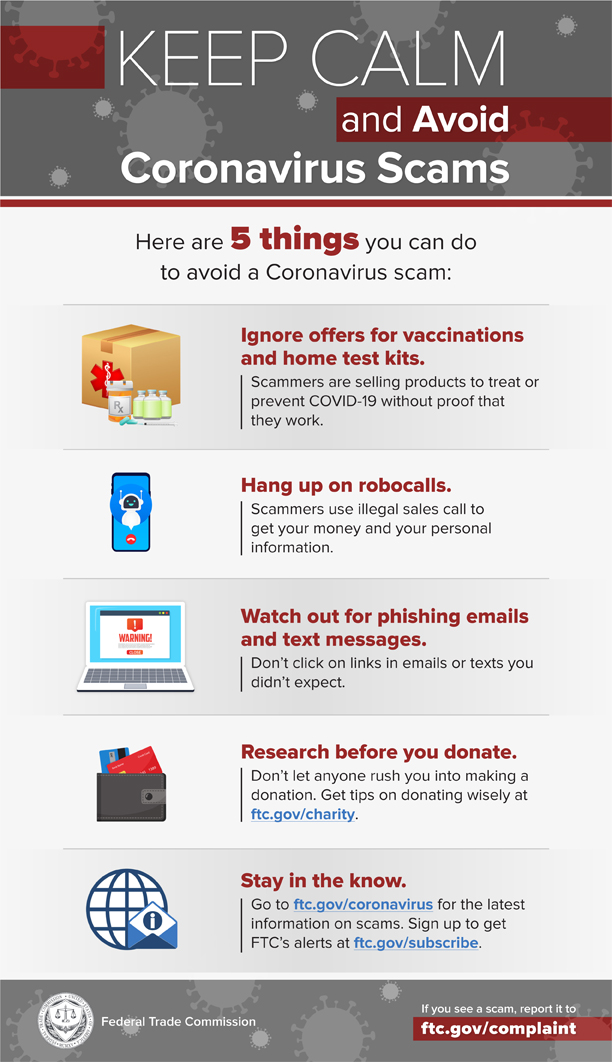Desperate times call for desperate measures in times of crisis; and desperate people use fear to take unfair advantage of other desperate people — and the current 2019 Novel Coronavirus pandemic is no different, as teas, essential oils, and colloidal silver are some of the products which are marketed to be used to treat or prevent yourself from being affected by the 2019 Novel Coronavirus…
5 Ways to Prevent Yourself From Being Scammed During the 2019 Novel Coronavirus Pandemic
…and they are only a few of the many scams which have been increasing significantly in recent weeks in order to take advantage of people who fear contracting the 2019 Novel Coronavirus themselves.
The companies which sell products which they purport to treat or prevent the 2019 Novel Coronavirus have no evidence or proof to back up their unsubstantiated claims — as required by law — according to the Federal Trade Commission of the United States; and no vaccines, drugs or investigational products which are currently available to treat or prevent the 2019 Novel Coronavirus have been officially approved, according to the Food and Drug Administration of the United States.
As a result, both federal agencies have joined forces by issuing warning letters since Friday, March 6, 2020 to 23 alleged sellers of unapproved and misbranded products and services to protect unwary consumers from being bombarded with purposely deceptive advertising in violation of the Federal Trade Commission Act.
Additionally, the Federal Trade Commission sent warning letters to 13 service providers of Voice over Internet Protocol and other companies at the time this article was written against “assisting and facilitating” illegal telemarketing calls related to the 2019 Novel Coronavirus pandemic.
The five ways you can protect yourself against becoming an unwary victim of scams pertaining to the 2019 Novel Coronavirus pandemic include:
- Do not respond to text messages, e-mail messages, or telephone calls pertaining to checks from the federal government of the United States, as the details are still coming together.
- Ignore online offers for vaccinations and home test kits, as no products have been proven to treat or prevent 2019 Novel Coronavirus at this time.
- Hang up on “robocalls”, as scammers are using illegal robocalls to pitch everything from low-priced health insurance to work-at-home schemes.
- Watch for e-mail messages claiming to be from the Centers for Disease Control and Prevention or the World Health Organization. Use Internet web sites like coronavirus.gov and usa.gov/coronavirus to get the latest information; and do not click on links from sources you do not know.
- Do your homework pertaining to donations. Never donate in cash, by using a gift card, or by wiring money.

Cyber Security Scam Alert Issued by the World Health Organization
The World Health Organization has officially issued a cyber security scam alert recently, warning to beware of criminals who pretend to be from the World Health Organization in order to perpetuate their deception upon innocent people.
Beware that hackers, cyber scammers, and other criminals are taking advantage of the 2019 Novel Coronavirus pandemic by using fraudulent e-mail messages, Internet web sites, telephone calls, text messages, WhatsApp messages, and even fax messages to perpetuate their scams by attempting to trick you into clicking on malicious links or opening attachments, which can then reveal your user name and password in order to to steal money or sensitive information from you.
If you are contacted by a person or organization that appears to be the World Health Organization, verify their authenticity before responding to them.
The World Health Organization will never:
- Ask for your user name or password to access safety information
- Send attachments in e-mail messages for which you did not ask
- Ask you to visit a link outside of www.who.int
- Charge money to apply for a job, register for a conference, or reserve a hotel
- Conduct lotteries or offer prizes, grants, certificates or funding through e-mail messages
Past Articles From the Federal Trade Commission Pertaining to 2019 Novel Coronavirus
The following 18 articles are from the official weblog of the Federal Trade Commission of the United States pertaining to scams and useful information related to the 2019 Novel Coronavirus pandemic:
- Avoiding SSA scams during COVID-19
- Avoid scams while finding help during quarantine
- The FTC keeps attacking robocalls
- Grandparent scams in the age of Coronavirus
- Small businesses: Where to go for financial relief information
- While you’re at home, spot the scams
- Want to get your Coronavirus relief check? Scammers do too.
- 60 and over in the time of COVID-19? Read on
- Socially distancing from COVID-19 robocall scams
- Thinking critically about Coronavirus news and information
- Seven Coronavirus scams targeting your business
- Now more than ever, spot the scams with #FTCScamBingo
- FTC: Coronavirus scams, Part 2
- Online security tips for working from home
- Checks from the government
- FTC & FDA: Warnings sent to sellers of scam Coronavirus treatments
- Coronavirus: Scammers follow the headlines
- FTC, FDA warn companies making Coronavirus claims
“Scammy” Telephone Calls Pertaining to the 2019 Novel Coronavirus
The following seven recordings of “scammy” telephone calls pertaining to the 2019 Novel Coronavirus are courtesy of Nomorobo:
- Fake tests for Medicare recipients
- Free test kit scam
- Sanitation supplies
- Health insurance pitches
- Mortgage scam
- Social Security Administration scam
- Small business listing scam
Other Activities, Related Articles, and Social Media “Shareables”
Learn more about the response from the Federal Trade Commission to the 2019 Novel Coronavirus — including how the agency is addressing competition matters.
Link to ftc.gov/coronavirus for the most up-to-date information from the Federal Trade Commission about 2019 Novel Coronavirus scams.
The following five articles pertain to advice which is offered by the Federal Trade Commission in general:
- Robocalls
- How to Block Unwanted Calls
- How to Recognize and Avoid Phishing Scams
- Miracle Health Claims
- How to Donate Wisely and Avoid Charity Scams
Other Articles From The Gate Pertaining to Scams in General
Although the articles listed below were written prior to the the 2019 Novel Coronavirus pandemic, some of them may also potentially be of help in preventing yourself from being scammed:
- Cyber Security Scam Alert Issued by the World Health Organization
- Watch Out For This E-Mail Message Scam Using Your Old Password For Extortion — and What You Can Do
- Watch Out For This Mobile Telephone Scam: You Calling Yourself — and What You Can Do
- 14 Tips on What You Can Do to Prevent From Being Scammed by a Rental Car Company
- Watch Out For This Taxi Scam
- Can You Hear Me? Do NOT Say Yes. Avoid This Telephone Scam…
- These Five Scams Snare Even Seasoned Travelers?
- Watch Out When Using a Gift Card — You Could Be Scammed
- Watch For This Scam On Credit Cards With Chips Embedded In Them
- Watch Out For This Federal Treasury Scam — and I Responded…
- Five Hotel Scams Which Could Ruin Your Next Hotel Stay?
- Las Vegas Taxi Scams? Forget That…I Walked.
- Airbnb “Host” Scams: Protect Yourself With One Simple Step
- Watch Out for This Scam While Traveling
- SCAM ALERT: Transferring Money to a Personal Account
- Traveller stuck scam
Other Articles From The Gate Pertaining to the 2019 Novel Coronavirus Pandemic
This article is the latest in a series pertaining to the 2019 Novel Coronavirus — which is also known as COVID-19 or 2019-nCoV or SARS-CoV-2 — pandemic in an effort to get the facts out with information derived from reliable sources…
…as well as attempt to maintain a reasoned and sensible ongoing discussion towards how to resolve this pandemic.
Other articles at The Gate which pertain to the 2019 Novel Coronavirus include:
- Latest Travel Advisory April 7 2020 From the Department of State of the United States
- Marriott Extends Status and Points For Everyone; Flexible Reservation Policy Updates: 2019 Novel Coronavirus Pandemic
- Alaska Airlines Extends Status and Benefits For Everyone: 2019 Novel Coronavirus Pandemic
- How to Save Up to 55 Percent on Restaurant Quality Steaks — Or Possibly More — But Hurry
- 8 Reasons to Be Careful About Buying Gift Cards Right Now…
- Yes, Marriott Insiders Forum HAS Shut Down and Moved
- United Airlines Extends Status and Benefits For Everyone: 2019 Novel Coronavirus Pandemic
- Headspace Meditation and Mindfulness Trial Offer With World of Hyatt
- Where Can You Find Gasoline for 99 Cents Per Gallon or Less April 5 2020 in the United States?
- Delta Air Lines Extends Status and Benefits For Everyone: 2019 Novel Coronavirus Pandemic
- Delta Air Lines Extends Ability to Rebook Up to 2 Years on Travel Impacted by 2019 Novel Coronavirus
- Cyber Security Scam Alert Issued by the World Health Organization
- Hyatt Extends Status and Points For Everyone; Flexible Reservation Policy Updates: 2019 Novel Coronavirus Pandemic
- Return to the United States NOW or Stay Abroad Indefinitely, Department of State Warns Citizens
- Face Covering? No Face Mask? Why Seemingly Conflicting Information From Two Reliable Sources
- No New Passport Applications Accepted Except for Emergency Situations Due to 2019 Novel Coronavirus
- Airlines are Obligated to Provide Prompt Refunds to Customers: Enforcement Notice 2020 From the Department of Transportation of the United States
- Should We Shut Down the World Every Three Years? Setting a Precedent With 2019 Novel Coronavirus Pandemic
- 2019 Novel Coronavirus is Not an April Fool’s Day Joke, Unfortunately
- Why You Should NOT Skip Credit Card Payments During the Pandemic
- Are Some Room Rates Not Being Reduced Because of Discrimination?
- What is the Difference Between Cleaning, Disinfecting, and Sanitizing?
- One Way Rental Car Offers in the United States 2020 — 2019 Novel Coronavirus
- Where Can You Find Gasoline for Less Than 90 Cents Per Gallon in the United States?
- Get 10 Percent Additional Value When Exchanging for Future Travel Voucher With Qatar Airways
- What is Wrong With This Photograph? Part 34: Coronavirus Edition
- Is Sheltering in Place Ordinance Unconstitutional? Man Sues Local Government
- One Illogically Irrational Aspect of the 2019 Novel Coronavirus Pandemic is…
- Updated Policies of 23 Lodging Companies Worldwide: 2019 Novel Coronavirus Pandemic
- More States Where You Can Find Gasoline for 99 Cents Per Gallon
- Do You Miss Dining on Airline Food? This Can Help…
- Do Not Read This Article. Take a Walk Instead. If You Can.
- Hilton Extends Status and Points For Everyone; Flexible Reservation Policy Updates: 2019 Novel Coronavirus Pandemic
- 5 Reasons Why I Have Not Changed Anything Despite 2019 Novel Coronavirus
- Revealing Parts of My Body to Help With Pandemic of 2019 Novel Coronavirus
- 2 Reliable Resources of Countries With Travel Entry Restrictions Due to 2019 Novel Coronavirus
- Most Restaurants Now Offer Free Delivery. What About the Gratuity?
- Most Trusted Traveler Programs Enrollment Temporarily Suspended Due to 2019 Novel Coronavirus
- Where Can You Find Gasoline for 99 Cents Per Gallon in the United States?
- Have We Become a Society of Wimps Addicted to Drama?
- Four Overused Terms of the 2019 Novel Coronavirus Era
- Several Rental Car Companies Waive Young Adult Fees Due to 2019 Novel Coronavirus
- National Park Service Suspends All Entrance Fees Due To Coronavirus Pandemic
- Passport Services Delayed Beyond 8 Weeks; Expedited Passport Services Suspended Indefinitely
- Global Level 4 Health Advisory Issued by Department of State of the United States
- What is Wrong With This Photograph? Part 30: Coronavirus Edition
- Countries With Travel Entry Restrictions Due to 2019 Novel Coronavirus: An Updated Comprehensive List
- 2019 Novel Coronavirus: Should You Travel Within the United States?
- $250 Billion Bailout Requested by Lodging Companies
- Countries With Travel Entry Restrictions Due to 2019 Novel Coronavirus: A Comprehensive List
- $50 Billion Bailout Requested by Airlines; Trump to “Back the Airlines 100%”
- Global Level 3 Health Advisory Issued by Department of State of the United States
- All Domestic Travel Banned For Personnel of Department of Defense of the United States
- March 15 2020: Checking Back In on 2019 Novel Coronavirus — My Opinions, If Anyone Cares
- Hotel Deploys Robots to Sanitize and Disinfect Rooms
- Ireland and the United Kingdom Added to Suspension for Most Foreign Nationals For 30 Days From Europe to the United States
- Change Fee and Cancellation Fee Policies and Waivers of 46 Airlines Due To 2019 Novel Coronavirus
- Up to 12 Ounces of Hand Sanitizer is Permitted Through Airport Security Checkpoints
- I Swear, If I Receive One More Message About How My Health and Safety are Their Top Priority…
- Four Reliable Resources For Travel and the 2019 Novel Coronavirus
- Just Shut Down the Entire Planet. Problem Solved?
- Stop the Hyperbole: Travel is NOT Banned Between the United States and Europe…
- Travel From Europe to the United States Suspended for Most Foreign Nationals For 30 Days
- My Unproven Secret to Not Contracting a Virus in Years
- Pandemic of 2019 Novel Coronavirus Declared by World Health Organization
- Official Warning Issued Against Travel by Cruise Ship Due to 2019 Novel Coronavirus by the Department of State of the United States
- Now the Entire Country of Italy is Under Quarantine
- 16 Million People Quarantined in Northern Italy
- Are Masks Effective Against 2019 Novel Coronavirus That People are Stealing Them?
- As Many as 46,000 People May Have Died in the United States Alone From…
- Lodging Companies Issue Travel Waivers and Elite Status Extensions 2020 Due to 2019 Novel Coronavirus
- Update: More Airlines Suspended Change and Cancellation Fees 2020 Due To Coronavirus
- Airlines Which Suspended Change and Cancellation Fees 2020 Due To Coronavirus
- Should You Be Concerned About Coronavirus?
- Travel Alert February 2020: Italy Now Affected by 2019 Novel Coronavirus
- Travel Alert February 2020: Northern Italy Now Affected by 2019 Novel Coronavirus
- Travel Alert February 2020: South Korea Now Affected by 2019 Novel Coronavirus
- A Deal to Antarctica Because of 2019 Novel Coronavirus — But Hurry
- Update: Do Not Travel to China Due to 2019 Novel Coronavirus, Says United States Department of State
- Travel Alert January 2020: Hong Kong Now Affected by 2019 Novel Coronavirus
- Update January 2020: Additional Airlines Issue Travel Waivers for 2019 Novel Coronavirus
- Travel Alert January 2020: 2019 Novel Coronavirus Affecting Air Travel
Summary
At the time this article was written, at least 85,522 people — or slightly greater than 5.95 percent — have died of the minimum of 1,436,198 confirmed cases worldwide, according to this situation dashboard from the World Health Organization pertaining to the 2019 Novel Coronavirus.
I firmly believe that the current madness pertaining to the 2019 Novel Coronavirus pandemic will eventually subside — but please do not let impatience and desperation compel you to act in a manner which may potentially be detrimental to you…
…and that especially includes being fooled by a scammer or a criminal. Nefarious people will do insidious acts against anyone — including truly frail and fragile people in our society — to profit in any way possible.
That anyone should even have to be concerned about the actions of scammers and criminals during a historical period of time — when we are all supposed to be “all in this together” — is truly despicable, deplorable, demeaning, degrading, and disgusting.
Photograph ©2016 by Brian Cohen.

